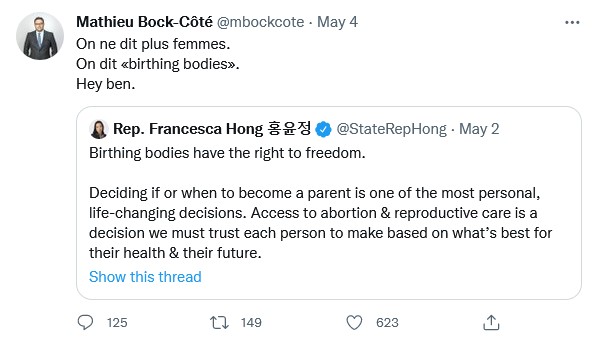
Why do we always have to re-invent the wheel of language?
When English is neither your first nor your second language, this re-invention can become too complex, especially for deer’s brains.
Does it always make sense to replace words by others? Or add new linguistic items?
When it is not an added pronoun after a name, it is a cancelled noun or verb.
How can we do this, if/when needed, without falling into absurdity or what looks like collective insanity… or stupidity?
Could we do it without seeming to insult the target we are referring to (i.e., women), like in the example below, ironically while defending their rights?
This post is specifically about a linguistic change related to women, which is being used by a woman about her fellow women. Not any woman, mind you. An American politician, as you can see below, thanks to a tweet by Dr. Mathieu Bock-Côté:

Bambi is wondering about the above, ahead of Mothers’ Day or… according to Ms. Hong, “Birthing bodies” day :). As a part of the 1% of women who have had recurrent miscarriages, defined as three or more, she finds this term even more absurd.
To conclude this post on a musical and light note, if she may, here are two songs from Bambi to this American politician, even without knowing her :)!

I guess the analogy is to ‘breeding horses / breeding mares.”
In my mind, this particular term “birthing bodies” shows that sometimes things are not thought through properly. In the desire to allow people to decide for themselves if they see themselves as women or men or something else, new terms are introduced to describe what e.g. used to be called a woman which not only like in this case exclude women who don’t have children but also lack the multidimensional integration of biological, social, spiritual etc. aspects that the term woman carries and ultimately objectify a multifaceted embodied living and lived experience. The term “birthing bodies” imo reveals a thought pattern which is highly Cartesian (res cogitans / res extensa dichotomy) with a mind that has lost contact to the embodied personal experience over time and ultimately results in solipsistic bodiless minds which see nature / bodies as material for unlimited manipulation. If not thought through to the end, things done with good intentions and in good faith can sometimes have unintended negative consequences.
“If not thought through to the end, things done with good intentions and in good faith can sometimes have unintended negative consequences.”.
Bambi agrees. The intention is often good (starting from a good place). The consequences can be negative, even if unintended.
Thank you Achim for your very thoughtful comment.